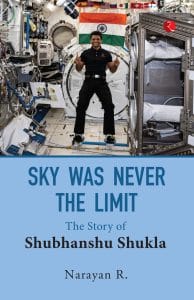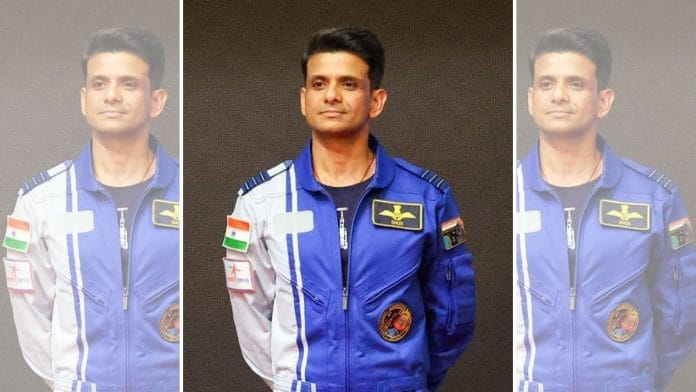On a quiet October morning in 1985, in the bustling lanes of Lucknow, a boy was born into a modest home—one that had no signs of destiny written on its doors, no medals on its walls, no dreams of the sky hung above. Shubhanshu Shukla was the youngest of three children in a middle-class Hindu family, where values mattered more than wealth, and books were treasured more than toys.
His father, Shambhu Dayal Shukla, a government officer with a stern sense of duty, and his mother, Asha, a gentle homemaker, nurtured their children with discipline and quiet affection. The family had no lineage of fliers or warriors, no tales of cockpits or space capsules—yet, somewhere in that simple household, a spark was taking shape.
Shubhanshu was not the kind of child who demanded attention. He didn’t race through the gullies chasing kites or cricket balls. Instead, he lingered in corners with books larger than himself, tracing the stars with his fingers and filling the silence with imagination.
‘He never gave us trouble,’ his mother recalls, her voice tinged with wonder. ‘Always with his books… he hardly stepped out to play.’ His father adds, ‘He had a quiet strength, a calming presence. Even as a child, he carried an unusual stillness—like he belonged to a bigger sky.’
That stillness, that curiosity, would one day propel him far beyond the streets of Lucknow—to the very edge of Earth’s atmosphere, where dreams become orbit. But back then, he was simply a boy—serious, serene and silent—carrying galaxies in his mind.
‘Jinhe Dekh Kar Lucknow Yaad Aaaye
Wo Adab Ki Misaal Hote Hain’
(‘Those who remind you of Lucknow at a glance, are embodiments of grace and culture…’)
Growing up in Lucknow—the timeless ‘City of Nawabs’, where tehzeeb meets tradition and the air hums with poetry and purpose—Shubhanshu Shukla was shaped by more than just streets and schools. He was cradled in a city that spoke in couplets, walked with grace and taught its children that knowledge was not a burden but a badge of honour. Amid the scent of kebabs, the echoes of ghazals and the quiet ambition of middle-class homes, Shukla began his journey—not with fanfare, but with fierce focus.
He attended City Montessori School (CMS), Aliganj campus—an institution as grand in its vision as the city itself. Known for nurturing global citizens with local roots, CMS had earned a UNESCO Prize for Peace Education, and it was here, amidst a sea of thousands, that a quiet boy stood out—not by voice, but by brilliance.
He was the kind who listened more than he spoke, but when he did, there was precision in thought and purpose in tone. Teachers admired his discipline; classmates recall a silent force—shy but resolute.
Even Kamna, his future wife and classmate since childhood, remembers him as ‘the quiet one with a never-say-never glint in his eyes’—the boy who solved problems with ease and smiled like he was carrying a secret plan. In truth, he was. The foundation of his greatness—humility, intellect and sheer determination—was already being laid, brick by brick, in the by-lanes of Lucknow. And even the city, with its fading havelis and eternal charm, seemed to whisper: this one will rise beyond us.
Also read: A Tamil Brahmin woman, a Muslim man and a bus called India. How Aparna Sen responded to Godhra
Sparks of Inspiration: Patriotism and Love for Flight
Despite having no family background in flying, Shubhanshu Shukla’s childhood imagination was ignited by two key experiences that set his sights on the skies and beyond:
- The Kargil War (1999): As an early teenager, Shukla was deeply inspired by the heroism of the Indian Armed Forces during the Kargil conflict. Watching news coverage of Indian soldiers and fighter pilots in action left a profound impression on him. The war’s display of patriotism and bravery stirred Shubhanshu’s own sense of duty. He began voicing a desire to serve the nation in uniform, telling his family that he wanted to join the armed forces to protect his country. This patriotic fire kindled by Kargil would strongly influence his career path in the years to come.
- An Airshow’s Thrill: Around the same time, a childhood trip to an Indian Air Force airshow proved transformative for Shukla. Seeing fighter jets roar across the sky in person—the deafening thunder of engines and blur of supersonic speed—left the young boy awestruck. He was mesmerized by the speed and sound of the aircraft, according to his elder sister’s recollection. It was at this airshow that Shubhanshu first voiced his dream of becoming a pilot one day. The experience planted a seed of ambition—he wanted to not just watch aeroplanes, but also fly them. From that moment, aviation became his passion. He would excitedly follow any news of aircraft and space missions, dreaming that he too might soar among the clouds or even the stars.
These early inspirations set Shukla apart from his peers. While many of his classmates were drawn to conventional career goals, young Shubhanshu’s head was already in the clouds—quite literally. By his mid-teens, he had resolved to pursue a path in the Indian Air Force (IAF), which he saw as the gateway to both serving his country and quenching his thirst for flight.
In the late 1990s and early 2000s, with the memory of India’s only astronaut Rakesh Sharma and the resurgence of the Indian space programme on the horizon, Shukla’s aspirations quietly expanded from flying fighter jets to perhaps one day venturing into space. Those ambitions, however, were kept mostly to himself—nurtured in silence until opportunity knocked.
Also read: How upper caste Hindus imbibed every privilege of White corporate America
A Secret Leap: Sneaking Out for the NDA Exam
Shubhanshu Shukla’s determination to join the armed forces culminated in a dramatic turning point when he was in high school. In 2001, at just 16 years old, he made a bold move—he secretly went to take the entrance exam for the National Defence Academy (NDA) without informing his family. The NDA is India’s elite joint services training academy, and admission is highly competitive, requiring candidates to pass a nationwide exam conducted by the UPSC. Shukla was still months away from finishing school, but his resolve was firm. The exam date, however, fell on an inopportune occasion— the day of his elder sister’s vidaai (farewell ceremony) after her wedding.
On the morning of 11 December 2001, as relatives gathered and emotional rituals were underway at home, young Shubhanshu was nowhere to be found. Family members noticed his absence at the crucial moment and grew frantic—his father, Shambhu Dayal, was furious that his teenage son would disappear during such an important family event. ‘Where is he? He should be here,’ his worried family exclaimed while searching for him. Unbeknownst to them, Shubhanshu had quietly slipped away at dawn, cycling off to an exam centre to sit for the NDA entrance test.
Shukla had kept his plan utterly secret. In fact, he hadn’t even purchased the application form himself—a close friend, who was slightly older but ineligible due to age, had obtained the NDA exam form and passed it to Shubhanshu, encouraging him to try his luck. Such was Shukla’s resolve that he did not seek any help or permission; he went alone to take the exam, determined not to miss this chance. Later that day, as the family fretted, Shubhanshu casually reappeared at home ‘speeding on his bicycle,’ just as the ceremonies were wrapping up. ‘I am here, now tell me what to do,’ he said calmly, as if nothing unusual had happened.
When the truth emerged that he had left to attend the NDA exam, his relatives were astonished. The entire family was initially furious—disappearing during his sister’s wedding festivities was a serious breach of expectations. But Shubhanshu did not lose his calm even under the onslaught of questions. Only a few days later did they learn the full story: he had not only taken the exam, he had passed it with flying colours. In fact, Shukla cleared the written test, the rigorous Services Selection Board (SSB) interviews, and the medical evaluations all on his own, without any guidance or fanfare. ‘One day he came and told us he had cleared everything—written, SSB, medical. That’s how he has always been—silently determined,’ his father recalls of that moment, half proud and half amazed.
 This excerpt from ‘Sky was Never the Limit: The Story of Shubhanshu Shukla’ by Narayan R has been published with permission from Rupa Publications.
This excerpt from ‘Sky was Never the Limit: The Story of Shubhanshu Shukla’ by Narayan R has been published with permission from Rupa Publications.






